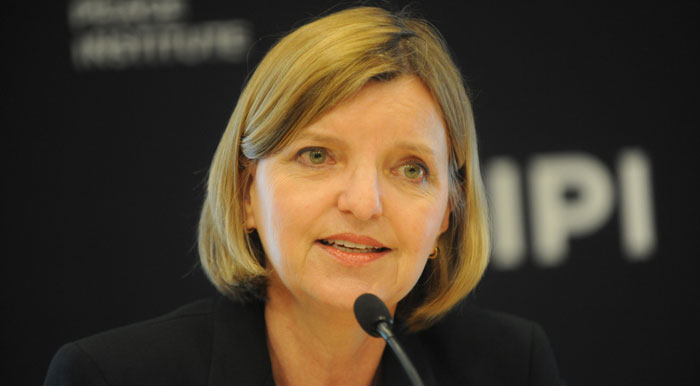
“Burundi has the opportunity to be an extraordinary success, and whether it is or not may be determined in the next three years,” said Karin Landgren, the outgoing Special Representative of the Secretary-General (SRSG) for Burundi, during an IPI event on July 16, 2012.
“So this is the place to watch, and this is the time to watch it.”
“Two weeks ago, Burundi celebrated its 50th anniversary of independence. For Burundi’s diplomatic partners, there was particular interest in what President Nkurunziza had to say on that day because the 50th has been heralded as a new beginning, a fresh opening to reconciliation and national unity.”
Ms. Landgren served as SRSG for Burundi and Head of the UN’s Office in Burundi (BNUB) for 18 months, from January 2011 to July 2012. In her presentation, she explained the challenges facing Burundi in 2012, what she calls a pivotal year in Burundi’s history.
“There are huge, long-term threats to Burundi. This is, depending how you count, the world’s third poorest or the world’s fifth poorest country.” The Burundian population faces an array of problems, including land shortages, a severe overpopulation issue, susceptibility to climate change, and dependency on a failing agricultural system.
Despite these issues, Ms. Landgren sees Burundi, a nation recovering from civil war, as relatively stable in terms of security. “It’s quite ironic that most of Burundi’s negative press lately has been over security.”
“The UN mission’s current mandate [in Burundi] runs until February 2013,” she said. In 2010/2011, Burundi transitioned successfully from a peacekeeping mission to a smaller special political mission. “This phase is generally seen as the last one of intensified political support before Burundi goes back to having a regular UN country team.” Ms. Landgren hopes to see pluralism return to Burundi’s political system before its 2015 elections.
Ms. Landgren also expressed concern over the extrajudicial killings that have been taking place in Burundi. “The UN mission documented 61 extrajudicial killings in Burundi in 2011. They were not all manifestly political, and they were certainly not the sum total of extrajudicial killings in Burundi that year,” she said. “Impunity is a continuing issue, a continuing problem.”
The number of extrajudicial killings in Burundi has decreased in 2012, perhaps in response to the Security Council’s resolution in December of 2011 that called for an end to such acts in the nation.
“The UN has been discussing transitional justice with Burundi since 2006. In 2009, there was quite an important national consultation process, which was tripartite: government, UN, and civil society.” The process showed that most Burundians want a transitional justice process to take place. But this process seems to have slowed down since.
“There is not a complete consensus in the international community about the outlook for Burundi. The glass is half empty or half full. What is going to be very important is that the international community as a whole encourage Burundi to pursue the reforms, to pursue the reconciliation that are vital and not to abandon the country on the basis that it’s gotten through its bad times, so it no longer needs us as much as it did. That would be the wrong thing to do at this point.”
The event was moderated by Warren Hoge, IPI Senior Adviser for External Relations.
Interview with Karin Landgren, Outgoing UN SRSG for Burundi
Watch event:







